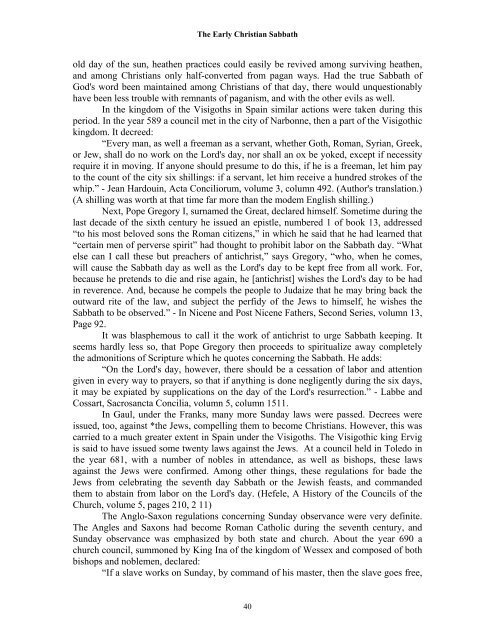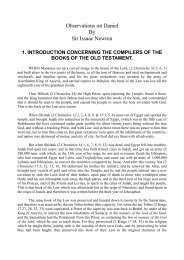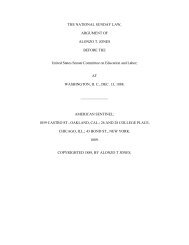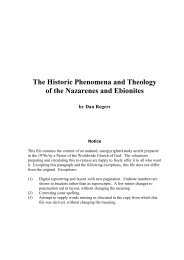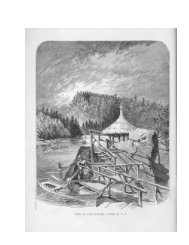THE EARLY CHRISTIAN SABBATH - Friends of the Sabbath Australia
THE EARLY CHRISTIAN SABBATH - Friends of the Sabbath Australia
THE EARLY CHRISTIAN SABBATH - Friends of the Sabbath Australia
You also want an ePaper? Increase the reach of your titles
YUMPU automatically turns print PDFs into web optimized ePapers that Google loves.
The Early Christian <strong>Sabbath</strong><br />
old day <strong>of</strong> <strong>the</strong> sun, hea<strong>the</strong>n practices could easily be revived among surviving hea<strong>the</strong>n,<br />
and among Christians only half-converted from pagan ways. Had <strong>the</strong> true <strong>Sabbath</strong> <strong>of</strong><br />
God's word been maintained among Christians <strong>of</strong> that day, <strong>the</strong>re would unquestionably<br />
have been less trouble with remnants <strong>of</strong> paganism, and with <strong>the</strong> o<strong>the</strong>r evils as well.<br />
In <strong>the</strong> kingdom <strong>of</strong> <strong>the</strong> Visigoths in Spain similar actions were taken during this<br />
period. In <strong>the</strong> year 589 a council met in <strong>the</strong> city <strong>of</strong> Narbonne, <strong>the</strong>n a part <strong>of</strong> <strong>the</strong> Visigothic<br />
kingdom. It decreed:<br />
“Every man, as well a freeman as a servant, whe<strong>the</strong>r Goth, Roman, Syrian, Greek,<br />
or Jew, shall do no work on <strong>the</strong> Lord's day, nor shall an ox be yoked, except if necessity<br />
require it in moving. If anyone should presume to do this, if he is a freeman, let him pay<br />
to <strong>the</strong> count <strong>of</strong> <strong>the</strong> city six shillings: if a servant, let him receive a hundred strokes <strong>of</strong> <strong>the</strong><br />
whip.” - Jean Hardouin, Acta Conciliorum, volume 3, column 492. (Author's translation.)<br />
(A shilling was worth at that time far more than <strong>the</strong> modem English shilling.)<br />
Next, Pope Gregory I, surnamed <strong>the</strong> Great, declared himself. Sometime during <strong>the</strong><br />
last decade <strong>of</strong> <strong>the</strong> sixth century he issued an epistle, numbered 1 <strong>of</strong> book 13, addressed<br />
“to his most beloved sons <strong>the</strong> Roman citizens,” in which he said that he had learned that<br />
“certain men <strong>of</strong> perverse spirit” had thought to prohibit labor on <strong>the</strong> <strong>Sabbath</strong> day. “What<br />
else can I call <strong>the</strong>se but preachers <strong>of</strong> antichrist,” says Gregory, “who, when he comes,<br />
will cause <strong>the</strong> <strong>Sabbath</strong> day as well as <strong>the</strong> Lord's day to be kept free from all work. For,<br />
because he pretends to die and rise again, he [antichrist] wishes <strong>the</strong> Lord's day to be had<br />
in reverence. And, because he compels <strong>the</strong> people to Judaize that he may bring back <strong>the</strong><br />
outward rite <strong>of</strong> <strong>the</strong> law, and subject <strong>the</strong> perfidy <strong>of</strong> <strong>the</strong> Jews to himself, he wishes <strong>the</strong><br />
<strong>Sabbath</strong> to be observed.” - In Nicene and Post Nicene Fa<strong>the</strong>rs, Second Series, volumn 13,<br />
Page 92.<br />
It was blasphemous to call it <strong>the</strong> work <strong>of</strong> antichrist to urge <strong>Sabbath</strong> keeping. It<br />
seems hardly less so, that Pope Gregory <strong>the</strong>n proceeds to spiritualize away completely<br />
<strong>the</strong> admonitions <strong>of</strong> Scripture which he quotes concerning <strong>the</strong> <strong>Sabbath</strong>. He adds:<br />
“On <strong>the</strong> Lord's day, however, <strong>the</strong>re should be a cessation <strong>of</strong> labor and attention<br />
given in every way to prayers, so that if anything is done negligently during <strong>the</strong> six days,<br />
it may be expiated by supplications on <strong>the</strong> day <strong>of</strong> <strong>the</strong> Lord's resurrection.” - Labbe and<br />
Cossart, Sacrosancta Concilia, volumn 5, column 1511.<br />
In Gaul, under <strong>the</strong> Franks, many more Sunday laws were passed. Decrees were<br />
issued, too, against *<strong>the</strong> Jews, compelling <strong>the</strong>m to become Christians. However, this was<br />
carried to a much greater extent in Spain under <strong>the</strong> Visigoths. The Visigothic king Ervig<br />
is said to have issued some twenty laws against <strong>the</strong> Jews. At a council held in Toledo in<br />
<strong>the</strong> year 681, with a number <strong>of</strong> nobles in attendance, as well as bishops, <strong>the</strong>se laws<br />
against <strong>the</strong> Jews were confirmed. Among o<strong>the</strong>r things, <strong>the</strong>se regulations for bade <strong>the</strong><br />
Jews from celebrating <strong>the</strong> seventh day <strong>Sabbath</strong> or <strong>the</strong> Jewish feasts, and commanded<br />
<strong>the</strong>m to abstain from labor on <strong>the</strong> Lord's day. (Hefele, A History <strong>of</strong> <strong>the</strong> Councils <strong>of</strong> <strong>the</strong><br />
Church, volume 5, pages 210, 2 11)<br />
The Anglo-Saxon regulations concerning Sunday observance were very definite.<br />
The Angles and Saxons had become Roman Catholic during <strong>the</strong> seventh century, and<br />
Sunday observance was emphasized by both state and church. About <strong>the</strong> year 690 a<br />
church council, summoned by King Ina <strong>of</strong> <strong>the</strong> kingdom <strong>of</strong> Wessex and composed <strong>of</strong> both<br />
bishops and noblemen, declared:<br />
“If a slave works on Sunday, by command <strong>of</strong> his master, <strong>the</strong>n <strong>the</strong> slave goes free,<br />
40


